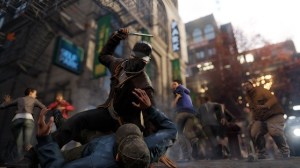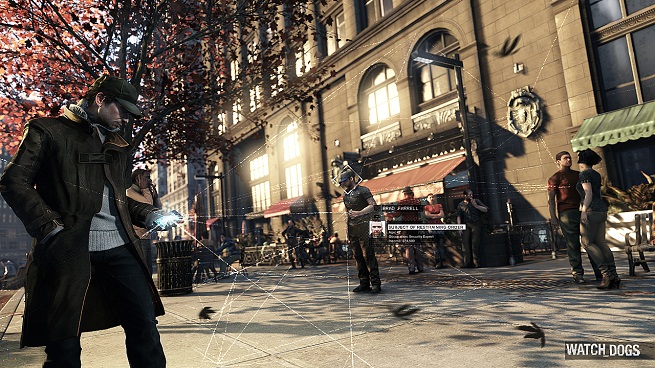Morin: It’s a different kind of scope, in all sorts of ways. It’s a matter of size versus density, I think. They have a lot of size there, a lot of space between the city and the outskirts. They have flying vehicles, which justify a lot of space. For us, we wanted players to spend a lot of time in one square block. We wanted to push density. It’s a different feel.
The city is still pretty big, but we wouldn’t have added a district for the sake of adding more scale. We don’t have jets. We have the profiler, where you can look at this thing for five minutes. Our scope is more on the depth of things. As far as the amount of time you can spend with it, though, I think it’s comparable to an extent.
GamesBeat: In one section, you have this ambush and a firefight, basically. It doesn’t necessarily play out like a shooter would, though, where you can shoot through everyone. Here you have to plan it out a little and set up certain elements as you go along. Why did you set that particular section up that way?
 Morin: There are tricks we can play in missions to throw you a bit off-balance. At the same time, one of the responsibilities of the game is to help the player understand its language. That’s what a game is. We have a game that adds an entire new layer of gameplay. If we don’t teach that naturally, then we shouldn’t expect players to embrace it.
Morin: There are tricks we can play in missions to throw you a bit off-balance. At the same time, one of the responsibilities of the game is to help the player understand its language. That’s what a game is. We have a game that adds an entire new layer of gameplay. If we don’t teach that naturally, then we shouldn’t expect players to embrace it.
Certain missions in the game are there to make sure you’ve mastered an element. We don’t want to have them all at the beginning, so it constantly feels like you’re learning something. If we had them all at the beginning, that would be a bit heavy. We teach the elements of the game through fun moments that bring you to expressing yourself differently, without feeling overly directed. The rest of it is tuning.
You need to have a game that’s balanced enough on the challenge side so that the player can fall back on their beloved old-school instincts, but without ever feeling like it’s too easy on that side. They can come back and see the benefits of taking their time, like you said, and doing things like using the cameras to tag enemies and manipulating the AI differently. It’s quite hard to throw a player off-balance naturally. You tend to go back to what you know will win. There’s a thin line there, to make sure that everything goes well.
GamesBeat: The first time I tried it, I think I was looking through a security camera while some guy was walking up behind me and shooting me. You can get a little too obsessed with your gadgets.
Morin: Yeah, you can. That’s part of the thematic of the game, the idea of obsession. Certain players, who are really into it, they can spend way too much time analyzing the possibilities. They enjoy that, and that’s fine. That’s part of what hacking is about. It’s a game that focuses a lot on our need to satisfy our curiosity. A lot more, actually, than focusing on technology.
GamesBeat: Did the real world change what you envisioned at some points? I know IBM has been talking a lot more about smart cities. About a year ago, you brought in the security firm Kaspersky to consult. Did some of these change the game along the way?
Morin: Not so much? Most of it was already there. When we started to make Watch Dogs and define the subject matter, we ended up digging a lot deeper than the average person, because we needed to understand what was doable in real life. We didn’t want to go sci-fi. I was scared of words like “cyberpunk” and all that. That was probably unnecessary, to an extent, but when you create a game for a lot of people, that’s a justified fear.
If you say that Watch Dogs is a cyberpunk game, you’re a prisoner of what cyberpunk means to everyone. If you toss that word aside, though, and instead you use the words that justify why you like cyberpunk, you can be more precise about what you need.
IBM doing smart cities, we knew about that a long time ago. We looked a lot at what Dubai was doing five and a half years ago. They have an entire department, almost a governmental movement, that’s sending choppers to deal with accidents and stuff like that. They have a whole set of interesting TV spots that talk about services and urbanism. I think it’s natural that reality has caught up.
Where I had no idea that it would go so deep is the timing of all that news, though. With Julian Assange, we already knew he was part of the picture. He was big news at the time. But now you have the timing of the NSA leaks, the Snowden affair. It was like there was some new big thing every week.
 GamesBeat: Last week, too, we had the Heartbleed OpenSSL vulnerability news.
GamesBeat: Last week, too, we had the Heartbleed OpenSSL vulnerability news.
Morin: Exactly. I’m getting Twitter questions like, “Were you aware of Heartbleed before it happened?” No! It’s happened countless times. We’d be in a brainstorm for a certain thing we wanted to do in the story, and two weeks later, a month later, it’d show up in the news. “Oh, great. Everyone’s going to think that’s where we got the idea.”
GamesBeat: It’s good to be ahead of where reality’s at.
Morin: It’s privileged timing. It was a combination of what was fascinating to us, and also just pure luck. When we started Watch Dogs, we just had the first-generation iPhone. In a building crammed with geeks, everyone had an iPhone. But as soon as I stepped outside of Ubisoft, my friends and family didn’t know what it was. It was natural timing to say, “Why not embrace that?”
We could have gone full 1984 and made a game where an evil corporation controls the entire world. But we wanted to talk about modern urban life. Orwell was smart, but he wasn’t exactly right in the end. When we started building the game, it was more about Aldous Huxley. That’s how I see myself and this thing. I love it. I put stuff in there. I’m comfortable in my own environment with it. I never step back and look at the consequences. This is a game that takes technology and uses it to put a mirror up in front of the player, to make them think a little bit.
GamesBeat: Do you still think this is a franchise that could lead to multiple games?
Morin: To me, when you make a game and want to make it well, it’s driven by the same need as making a great franchise. But it’s the players who decide whether there’s a franchise here or not. They need to show that they like the universe they’re in and they want to dig further. If they say that, I’ll be more than happy to dig further with them.
VentureBeat's mission is to be a digital town square for technical decision-makers to gain knowledge about transformative enterprise technology and transact. Learn More




![Reblog this post [with Zemanta]](http://img.zemanta.com/reblog_e.png?x-id=ae0492cf-1ce1-4969-93c8-aac4c0ef4585)
